Not that long ago, one could only see a few foreigners in Korean movies or TV shows. Now, however, befitting the modernized world created by economic development and globalization, more and more non-Korean talent of diverse nationalities is appearing in the domestic motion picture, music and broadcasting industry.
In days of past, non-Korean celebrities only had to show off their clean-cut features, which were then enough to gain what they wanted here: popularity. They were not able to actually earn the “real hearts” of their Korean audience and failed to communicate with the crowds, mainly due to their limited proficiency in the Korean language. Now, however, that has all changed.
There are many active non-Korean entertainers in Korean show business these days, acting and singing in fluent Korean and armed with well-defined features and unbridled talent. Korean audiences, naturally, feel a lot closer to these Korean-speaking foreign stars, even if they are of a different color or nationality.
Among them is Australia-born Sam Hammington. Many people are glued to the TV at certain timeslots to watch Hammington’s appearance on several entertainment shows, including “Real Men,” a segment of MBC’s “Sunday Night” variety show, the talk show “Witch Hunt” aired on JTBC where he is the host, and on tvN’s “Island Village Teacher” variety show. The Australian star mesmerizes his fans by throwing impish jokes with the use of his Korean-language humor.
Hammington in particular garners a lot of attention on his “Real Men” show, aired on MBC. He endures the arduous life of an army recruit, along with other Korean celebrities, taking his viewers on an emotional trip, sometimes tear-jerking and sometimes hilarious.
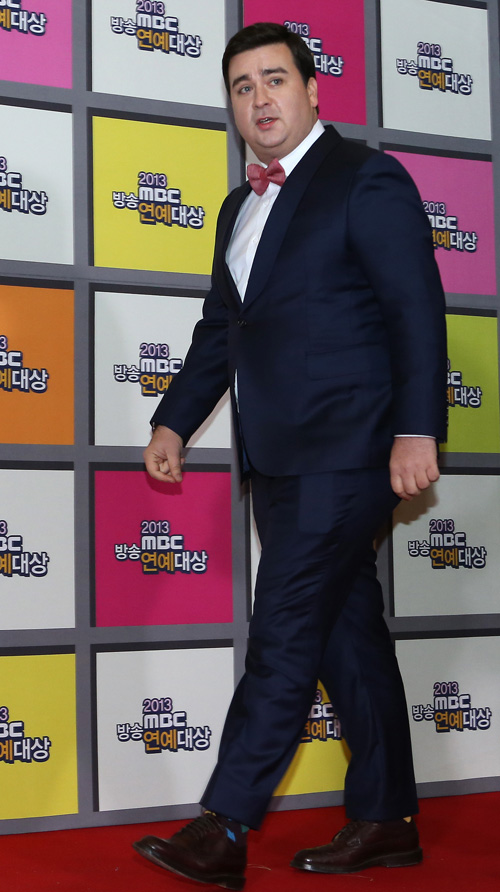
Beyond television, there are also foreign stars making their presence felt in Korean dramas and movies as well. One of them is Daniel Henney from the U.S. The American actor made his debut in the 2005 MBC hit drama “My Lovely Sam Soon.”
He also starred in a series of films including “Seducing Mr. Perfect” in 2006, “My Father” in 2007 and, most recently, “The Spy,” which came out last year. Henney keeps up with his Korean co-actors and co-actresses, speaking Korean fluently.
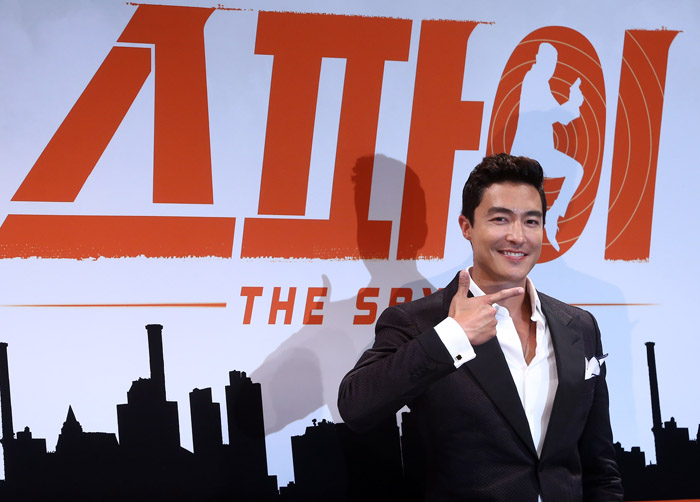
Two other entertainers, from Japan and France, have also been actively engaged in the drama realm: Fujii Mina and Julien Kang. They have been appearing together as a couple in the tvN sitcom “Potato Star 2013QR3” since November last year.
In this drama, Fujii Mina acts as a careless but cute woman who often falls down or hits her head on something, while Julien Kang plays her boyfriend whose whimsical behavior and somewhat awkward Korean, in stark contrast to his good looks, brings peals of laughter to the small screen.
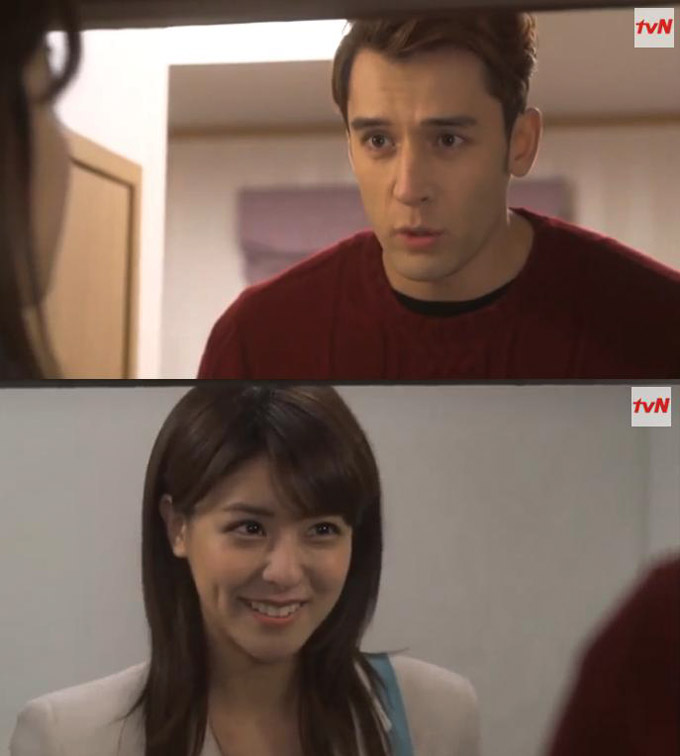
The two stars are expanding their fan base here in show business, as well. They each had a regular slot in the “world edition” fourth season of “We Got Married,” a famous variety show broadcast on MBC last year.
Fujii was coupled with Lee Hong-ki, a lead vocalist from the five-member boy band F.T. Island, and Kang was set up with actress Yoon Se-ah as a virtual couple. They created interesting hypothetical experiences of what could happen were a foreigner and a Korean to get married.
The growing inflow of non-Korean talent across the Korean entertainment world can be explained, to some degree, by hallyu, the Korean Wave that has been spreading across many parts of the world over the past few years. Promising talent from other countries, now fascinated by Korea pop culture, no longer see Korean stars as just an object of envy. Now, it is common to see foreigners coming to Korea and trying out for an audition or enrolling in dance courses to become one of them.
According to pop culture pundits, there will be more activities for non-Koreans in the Korean entertainment realm and that will surely add more color to Korean culture.
*Interview with Fujii Mina
Fujii Mina made her debut as a child actress at the early age of nine and since then she has enjoyed huge popularity in her home country, Japan. When the Korean drama industry was booming in Japan, Fujii came across the smash hit series “Winter Sonata” and got mesmerized by the male lead Bae Yong-joon.
Her interest in one Korean actor developed into a love for the Korean language and the nation itself. She started learning Korean in hopes that she could watch the drama without subtitles.
Her many years of effort to build up her Korean skills paid off when she was cast in numerous Korean dramas in 2012, though only in minor roles, including “The Lord of the Drama” on SBS, “Ms. Panda and Mr. Hedgehog” on Channel A and “Another Wedding” on KBS.
Korea.net met Fujii to hear about her ever-advancing journey into the world of Korean entertainment.
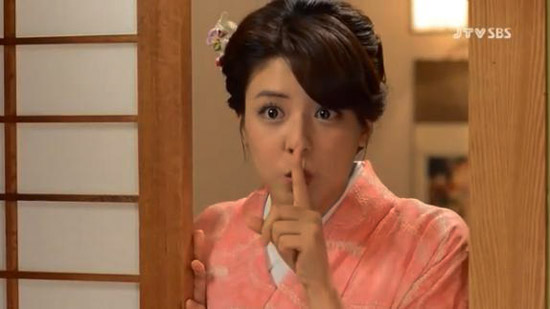
1) You have been part of numerous Korean TV programs since 2012. It must be difficult to travel back and forth between Korea and Japan.
I traveled a lot between the two nations last year, but wherever I am, I feel happy and enjoy every moment because I’m doing what I love to do.
No matter how hard it is or how busy I get, I love what I am doing. Because of a tight schedule, I’ve stayed here all throughout the first month of 2014. I am really happy.
2) We heard that you started learning Korean after you saw the drama “Winter Sonata.” Please tell us about what you like about the language and what the biggest challenge was for you.
The first couple of years into learning Korean, I only found it very interesting. I could have easy access to Korean dramas, which at that time were very popular in Japan. I studied Korean, watching dramas and listening to K-pop music as well. Even when in college, I learned Korean as my second foreign language.
As I started acting here in Korea, I felt like I still had a long way to go. I should speak Korean naturally and fluently to be on Korean TV, but my intonation still sounds awkward. The hardest part, for me, is when I have to speak with varied intonation and accurate pronunciation.
I realize every day that I still have many things to study. Now that I’m staying here, I’m learning and listening to “live Korean” every single day. I practice a lot, repeating what I hear on TV, to make my intonation sound better.
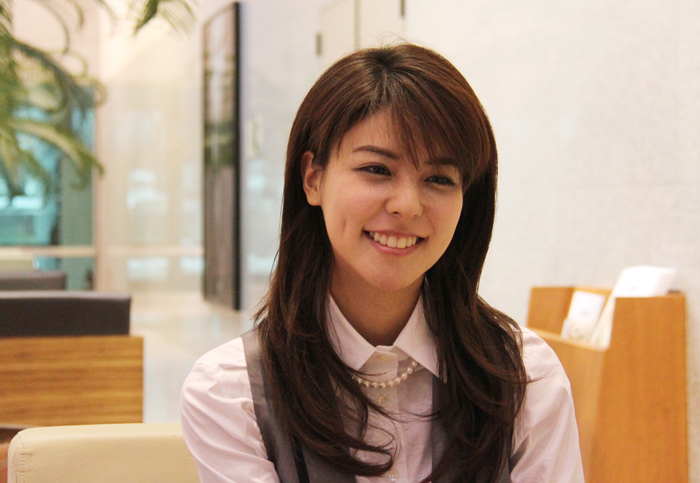
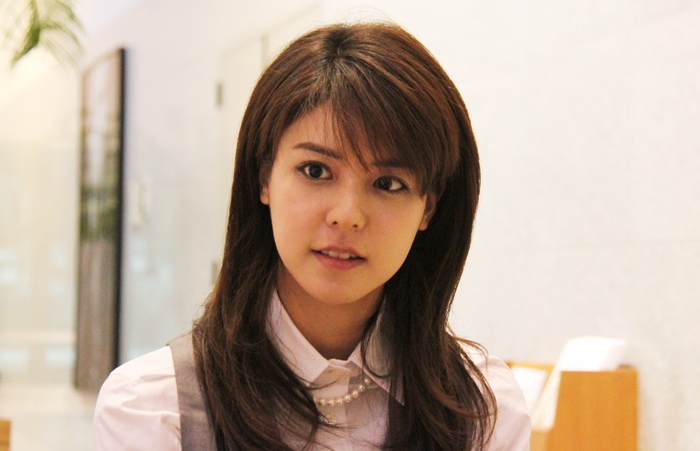
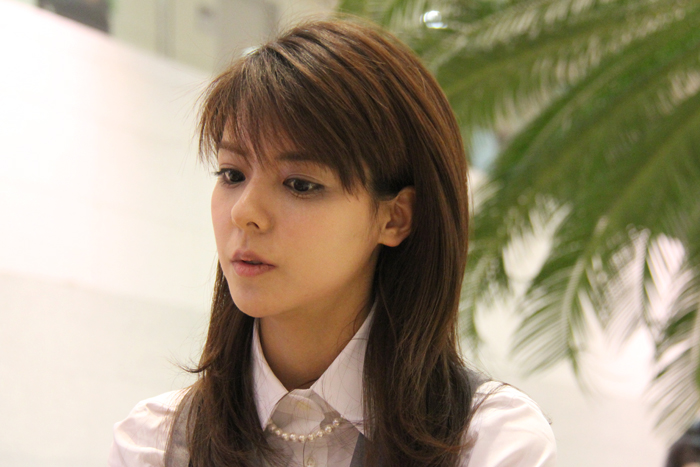
3) You appeared in the SBS drama “The Lord of the Drama” in 2012. It’s very impressive to hear you speak all your lines in Korean. Wasn’t it difficult?
I started my acting career in Korea back in 2012. Shortly afterward, I had a chance to audition for a Japanese character in the drama and was hard at work preparing for it. I was so lucky to seize the chance.
One day, I sat down with Jang Hang-joon, the director of the drama, and when he heard me reading the Korean script, he said, “You sound too awkward.” He always threw me a barrage of harsh words. He even told me, “You could be replaced by another actress if you keep on like this.”
I was worried that that might really happen. In order not to make it happen, I practiced over and over again. In retrospect, his sternness kept me going. I met him the other day and he told me that he intentionally blasted me that harshly to make me go full steam ahead.
4) We think you must have gone through some distressing and painful moments as well.
Sure. As I told you, acting in Korean is the most difficult thing for me. It takes me far longer to memorize scripts. I keep practicing and figuring out what needs to be corrected all by myself.
5) When do you think was the most memorable moment?
It has been one and a half years since I started my acting career here. Among others, the “We Got Married” show is the most valuable work I’ve ever done. I enjoyed watching the program in Japan, too. I feel honored to have been part of a program I really love watching.
The show is very popular in Japan, too. I even gave its DVD to my parents and they loved it, too.
6) What do you think is the biggest difference between Korean and Japanese cultures?
There’re some differences in the way they express how they feel. The Japanese tend to be less straightforward about their feelings, while Koreans are very honest and open in expressing their emotion. That applies to acting, as well. Korean actors and actresses are very good at showing their emotion when acting. Because of that, I felt a bit awkward when I was asked to act with great emotion, but now I’ve gotten more accustomed to it.
Another difference was when my friend hung up saying, “I’ll get back to you,” after talking to me over the phone. For the rest of the day, I expected her to call me back, as she said she would. Later, I found that Koreans usually say that when they say goodbye over the line. That’s one of the interesting cultural differences I’ve experienced.
7) What made you choose Korea among so many other choices all around the world?
I wanted to know more about this country. I love everything about this country, from its dramas, movies and songs all the way through to its language and people. The first time I visited this country was four or five years ago. I travelled to Namiseom Island along with my mother and grandmother, both big fans of “Winter Sonata,” like me. I remember having acted there as if I were the female lead Choi Ji-woo in the drama.
8) Do you have anything to say to foreigners who wish to build their acting career in Korea, like you? Also, please tell us what more you want to achieve here.
As I am still “dreaming,” I am not sure whether it is right for me to give any advice. All I want to say is, “Let’s do the best together.”
In Japan, I thought that I should look as perfect as I could as a screen actress. That’s why I’d never set foot in the reality TV business, where I could make a slip of the tongue or do something reckless.
Here, though, I can see many actors and actresses in variety shows where they show their true selves, just as they really are. So I decided to take the chance to appear on such shows. Sometimes, I made grammar mistakes and didn’t look as perfect as I was in the dramas or movies. However, my fans take me for who I am, as a human, and root for me. I am so happy.
While I am here, what I see and hear every day is all part of the learning process for me. I will be staying for another three or four months, to continue shooting the sitcom “Potato Star 2013QR3.”
Last year, I did three films in Japan and one of them has already been released. The two others are coming out soon.
I still have many roles I want to play in dramas and, hopefully, movies, as well. I don’t have any experience with Korean movies yet, but this year I hope to have a chance.
By Sohn JiAe
Korea.net Staff Writer
jiae5853@korea.kr
In days of past, non-Korean celebrities only had to show off their clean-cut features, which were then enough to gain what they wanted here: popularity. They were not able to actually earn the “real hearts” of their Korean audience and failed to communicate with the crowds, mainly due to their limited proficiency in the Korean language. Now, however, that has all changed.
There are many active non-Korean entertainers in Korean show business these days, acting and singing in fluent Korean and armed with well-defined features and unbridled talent. Korean audiences, naturally, feel a lot closer to these Korean-speaking foreign stars, even if they are of a different color or nationality.
Among them is Australia-born Sam Hammington. Many people are glued to the TV at certain timeslots to watch Hammington’s appearance on several entertainment shows, including “Real Men,” a segment of MBC’s “Sunday Night” variety show, the talk show “Witch Hunt” aired on JTBC where he is the host, and on tvN’s “Island Village Teacher” variety show. The Australian star mesmerizes his fans by throwing impish jokes with the use of his Korean-language humor.
Hammington in particular garners a lot of attention on his “Real Men” show, aired on MBC. He endures the arduous life of an army recruit, along with other Korean celebrities, taking his viewers on an emotional trip, sometimes tear-jerking and sometimes hilarious.

Australian Sam Hammington is one of the growing number of non-Korean stars active in Korean show business. (Photo: Yonhap News)
Beyond television, there are also foreign stars making their presence felt in Korean dramas and movies as well. One of them is Daniel Henney from the U.S. The American actor made his debut in the 2005 MBC hit drama “My Lovely Sam Soon.”
He also starred in a series of films including “Seducing Mr. Perfect” in 2006, “My Father” in 2007 and, most recently, “The Spy,” which came out last year. Henney keeps up with his Korean co-actors and co-actresses, speaking Korean fluently.

U.S.-born actor Daniel Henney answers questions at a preview for the movie “The Spy” last year. (Photo: Yonhap News)
Two other entertainers, from Japan and France, have also been actively engaged in the drama realm: Fujii Mina and Julien Kang. They have been appearing together as a couple in the tvN sitcom “Potato Star 2013QR3” since November last year.
In this drama, Fujii Mina acts as a careless but cute woman who often falls down or hits her head on something, while Julien Kang plays her boyfriend whose whimsical behavior and somewhat awkward Korean, in stark contrast to his good looks, brings peals of laughter to the small screen.
A scene from the tvN sitcom “Potato Star 2013QR3” starring France-born Julien Kang (top) and Japanese actress Fujii Mina. (Photo: captures image)
The two stars are expanding their fan base here in show business, as well. They each had a regular slot in the “world edition” fourth season of “We Got Married,” a famous variety show broadcast on MBC last year.
Fujii was coupled with Lee Hong-ki, a lead vocalist from the five-member boy band F.T. Island, and Kang was set up with actress Yoon Se-ah as a virtual couple. They created interesting hypothetical experiences of what could happen were a foreigner and a Korean to get married.
The growing inflow of non-Korean talent across the Korean entertainment world can be explained, to some degree, by hallyu, the Korean Wave that has been spreading across many parts of the world over the past few years. Promising talent from other countries, now fascinated by Korea pop culture, no longer see Korean stars as just an object of envy. Now, it is common to see foreigners coming to Korea and trying out for an audition or enrolling in dance courses to become one of them.
According to pop culture pundits, there will be more activities for non-Koreans in the Korean entertainment realm and that will surely add more color to Korean culture.
*Interview with Fujii Mina
Fujii Mina made her debut as a child actress at the early age of nine and since then she has enjoyed huge popularity in her home country, Japan. When the Korean drama industry was booming in Japan, Fujii came across the smash hit series “Winter Sonata” and got mesmerized by the male lead Bae Yong-joon.
Her interest in one Korean actor developed into a love for the Korean language and the nation itself. She started learning Korean in hopes that she could watch the drama without subtitles.
Her many years of effort to build up her Korean skills paid off when she was cast in numerous Korean dramas in 2012, though only in minor roles, including “The Lord of the Drama” on SBS, “Ms. Panda and Mr. Hedgehog” on Channel A and “Another Wedding” on KBS.
Korea.net met Fujii to hear about her ever-advancing journey into the world of Korean entertainment.

Japanese actress Fujii Mina speaks fluent Korean in a scene from the 2012 SBS drama “The Lord of the Drama.” (Photo: captured image of “The Lord of the Drama”)
1) You have been part of numerous Korean TV programs since 2012. It must be difficult to travel back and forth between Korea and Japan.
I traveled a lot between the two nations last year, but wherever I am, I feel happy and enjoy every moment because I’m doing what I love to do.
No matter how hard it is or how busy I get, I love what I am doing. Because of a tight schedule, I’ve stayed here all throughout the first month of 2014. I am really happy.
2) We heard that you started learning Korean after you saw the drama “Winter Sonata.” Please tell us about what you like about the language and what the biggest challenge was for you.
The first couple of years into learning Korean, I only found it very interesting. I could have easy access to Korean dramas, which at that time were very popular in Japan. I studied Korean, watching dramas and listening to K-pop music as well. Even when in college, I learned Korean as my second foreign language.
As I started acting here in Korea, I felt like I still had a long way to go. I should speak Korean naturally and fluently to be on Korean TV, but my intonation still sounds awkward. The hardest part, for me, is when I have to speak with varied intonation and accurate pronunciation.
I realize every day that I still have many things to study. Now that I’m staying here, I’m learning and listening to “live Korean” every single day. I practice a lot, repeating what I hear on TV, to make my intonation sound better.



Japanese actress Fujii Mina (Photos: Wi Tack-whan)
3) You appeared in the SBS drama “The Lord of the Drama” in 2012. It’s very impressive to hear you speak all your lines in Korean. Wasn’t it difficult?
I started my acting career in Korea back in 2012. Shortly afterward, I had a chance to audition for a Japanese character in the drama and was hard at work preparing for it. I was so lucky to seize the chance.
One day, I sat down with Jang Hang-joon, the director of the drama, and when he heard me reading the Korean script, he said, “You sound too awkward.” He always threw me a barrage of harsh words. He even told me, “You could be replaced by another actress if you keep on like this.”
I was worried that that might really happen. In order not to make it happen, I practiced over and over again. In retrospect, his sternness kept me going. I met him the other day and he told me that he intentionally blasted me that harshly to make me go full steam ahead.
4) We think you must have gone through some distressing and painful moments as well.
Sure. As I told you, acting in Korean is the most difficult thing for me. It takes me far longer to memorize scripts. I keep practicing and figuring out what needs to be corrected all by myself.
5) When do you think was the most memorable moment?
It has been one and a half years since I started my acting career here. Among others, the “We Got Married” show is the most valuable work I’ve ever done. I enjoyed watching the program in Japan, too. I feel honored to have been part of a program I really love watching.
The show is very popular in Japan, too. I even gave its DVD to my parents and they loved it, too.
6) What do you think is the biggest difference between Korean and Japanese cultures?
There’re some differences in the way they express how they feel. The Japanese tend to be less straightforward about their feelings, while Koreans are very honest and open in expressing their emotion. That applies to acting, as well. Korean actors and actresses are very good at showing their emotion when acting. Because of that, I felt a bit awkward when I was asked to act with great emotion, but now I’ve gotten more accustomed to it.
Another difference was when my friend hung up saying, “I’ll get back to you,” after talking to me over the phone. For the rest of the day, I expected her to call me back, as she said she would. Later, I found that Koreans usually say that when they say goodbye over the line. That’s one of the interesting cultural differences I’ve experienced.
7) What made you choose Korea among so many other choices all around the world?
I wanted to know more about this country. I love everything about this country, from its dramas, movies and songs all the way through to its language and people. The first time I visited this country was four or five years ago. I travelled to Namiseom Island along with my mother and grandmother, both big fans of “Winter Sonata,” like me. I remember having acted there as if I were the female lead Choi Ji-woo in the drama.
8) Do you have anything to say to foreigners who wish to build their acting career in Korea, like you? Also, please tell us what more you want to achieve here.
As I am still “dreaming,” I am not sure whether it is right for me to give any advice. All I want to say is, “Let’s do the best together.”
In Japan, I thought that I should look as perfect as I could as a screen actress. That’s why I’d never set foot in the reality TV business, where I could make a slip of the tongue or do something reckless.
Here, though, I can see many actors and actresses in variety shows where they show their true selves, just as they really are. So I decided to take the chance to appear on such shows. Sometimes, I made grammar mistakes and didn’t look as perfect as I was in the dramas or movies. However, my fans take me for who I am, as a human, and root for me. I am so happy.
While I am here, what I see and hear every day is all part of the learning process for me. I will be staying for another three or four months, to continue shooting the sitcom “Potato Star 2013QR3.”
Last year, I did three films in Japan and one of them has already been released. The two others are coming out soon.
I still have many roles I want to play in dramas and, hopefully, movies, as well. I don’t have any experience with Korean movies yet, but this year I hope to have a chance.
By Sohn JiAe
Korea.net Staff Writer
jiae5853@korea.kr